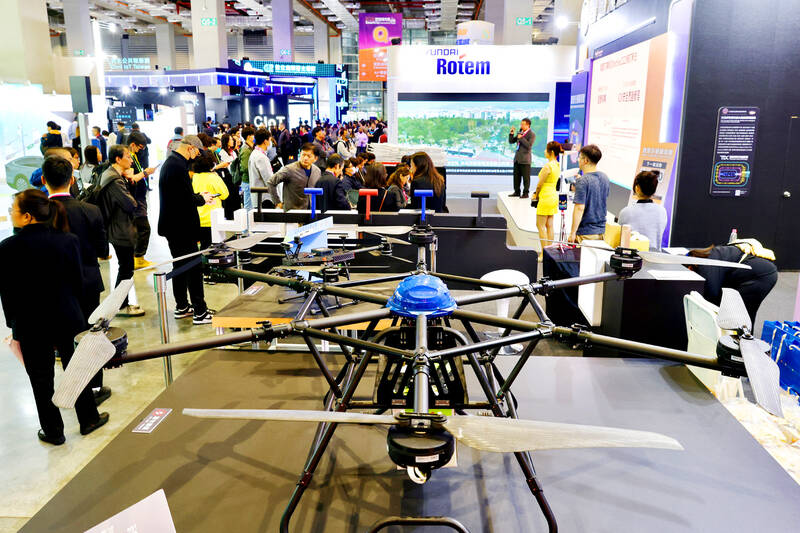The Smart City Summit & Expo (SCSE) and the Net Zero City Expo kicked off yesterday in Taipei, welcoming approximately 500 foreign guests from 112 cities in 46 countries.
The SCSE is being held for the 11th year, while the Net Zero City Expo is in its second year, jointly welcoming 495 city heads and city administrators from 112 cities and over 1,697 international professional buyers, Paul Peng (彭双浪), chairman of the event organizer Taipei Computer Association (台北市電腦公會), said at the opening ceremony.
The two expositions have been held together since last year, and involve enterprises and government departments sharing how 5G and artificial intelligence of things (AIOT) have been applied to building smarter and cleaner cities, Peng said.

Photo: Ritchie B. Tongo, EPA-EFE
The smart city expo will also take place in Kaohsiung tomorrow, and together the three exhibitions will host more than 600 companies and agencies presenting smart solutions on education, medical services, transportation, security and architecture, representing 13 percent growth from last year, Peng said.
National Development Council Minister Kung Ming-hsin (龔明鑫) said in his opening remarks that Taiwan used to be famous for Computex, the annual computer expo held in Taipei, "as hardware products are Taiwanese companies’ strength."
"Building a smart city involves leaping out of the hardware thinking box and finding solutions for future cities in advance," he said, adding that the goal of reaching net zero in 2050 is another step further in the development process.
The net zero city expo featured a city leaders summit yesterday that included several forums on different topics such as energy transition, just transition, and lifestyle transition.
Forums on net zero transition and global carbon market are to take place today and tomorrow, respectively, at Taipei Nangang Exhibition Center Hall 2.

The US dollar was trading at NT$29.7 at 10am today on the Taipei Foreign Exchange, as the New Taiwan dollar gained NT$1.364 from the previous close last week. The NT dollar continued to rise today, after surging 3.07 percent on Friday. After opening at NT$30.91, the NT dollar gained more than NT$1 in just 15 minutes, briefly passing the NT$30 mark. Before the US Department of the Treasury's semi-annual currency report came out, expectations that the NT dollar would keep rising were already building. The NT dollar on Friday closed at NT$31.064, up by NT$0.953 — a 3.07 percent single-day gain. Today,

‘SHORT TERM’: The local currency would likely remain strong in the near term, driven by anticipated US trade pressure, capital inflows and expectations of a US Fed rate cut The US dollar is expected to fall below NT$30 in the near term, as traders anticipate increased pressure from Washington for Taiwan to allow the New Taiwan dollar to appreciate, Cathay United Bank (國泰世華銀行) chief economist Lin Chi-chao (林啟超) said. Following a sharp drop in the greenback against the NT dollar on Friday, Lin told the Central News Agency that the local currency is likely to remain strong in the short term, driven in part by market psychology surrounding anticipated US policy pressure. On Friday, the US dollar fell NT$0.953, or 3.07 percent, closing at NT$31.064 — its lowest level since Jan.

The New Taiwan dollar and Taiwanese stocks surged on signs that trade tensions between the world’s top two economies might start easing and as US tech earnings boosted the outlook of the nation’s semiconductor exports. The NT dollar strengthened as much as 3.8 percent versus the US dollar to 30.815, the biggest intraday gain since January 2011, closing at NT$31.064. The benchmark TAIEX jumped 2.73 percent to outperform the region’s equity gauges. Outlook for global trade improved after China said it is assessing possible trade talks with the US, providing a boost for the nation’s currency and shares. As the NT dollar

The Financial Supervisory Commission (FSC) yesterday met with some of the nation’s largest insurance companies as a skyrocketing New Taiwan dollar piles pressure on their hundreds of billions of dollars in US bond investments. The commission has asked some life insurance firms, among the biggest Asian holders of US debt, to discuss how the rapidly strengthening NT dollar has impacted their operations, people familiar with the matter said. The meeting took place as the NT dollar jumped as much as 5 percent yesterday, its biggest intraday gain in more than three decades. The local currency surged as exporters rushed to